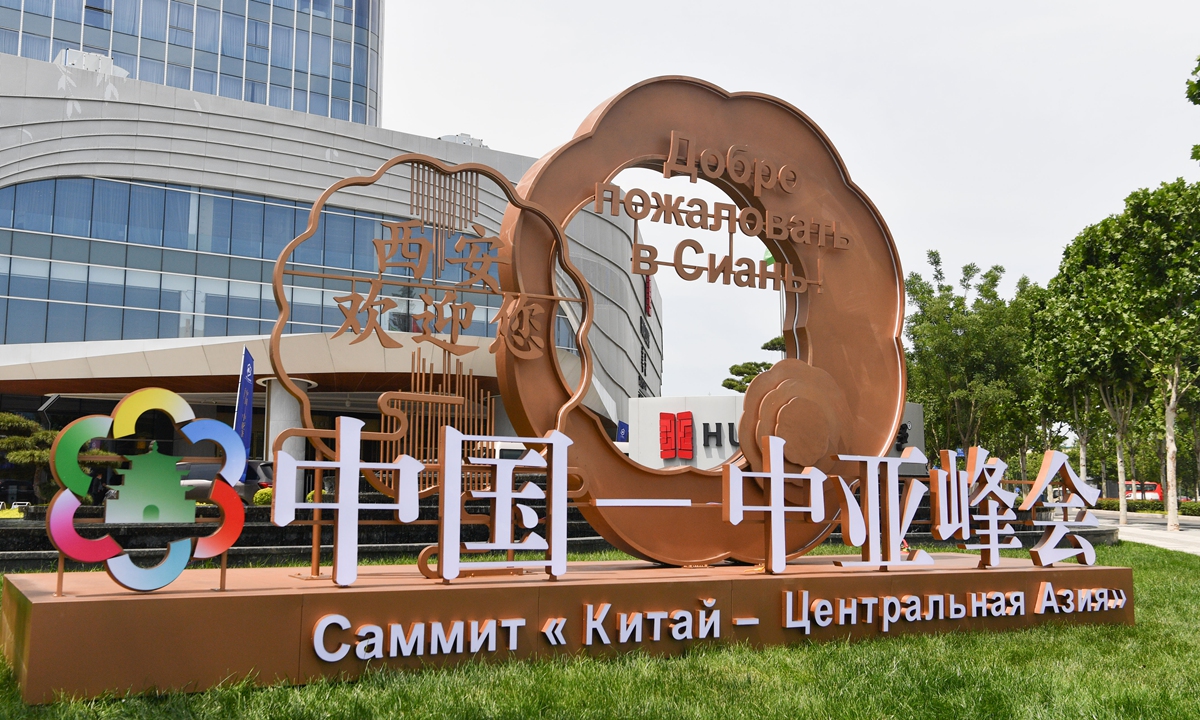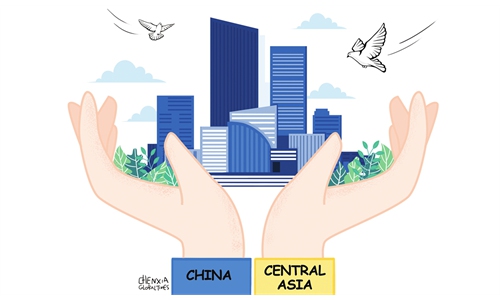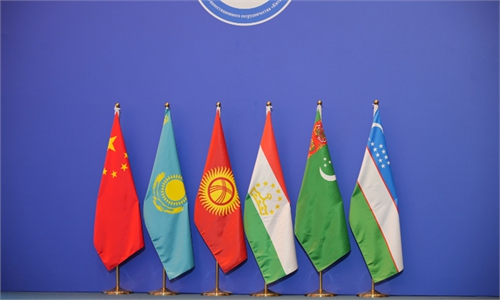Unlike elite club of G7, China-Central Asia Summit unites, consolidates a diverse world

An installation for the China-Central Asia Summit in both Chinese and Russian sits outside the press center of the summit in Xi'an, Northwest China's Shaanxi Province on May 16, 2023. The summit is set to take place on May 18 and 19. Photo: Xinhua
The modern world is in a situation of division. In this situation, a special role is assigned to dialogue platforms and interstate associations that can unite the efforts of countries interested in overcoming global turbulence. But we have to say that not all influential subjects of international relations were ready for such a test.
The Group of Seven (G7) summit in Hiroshima will be held from Friday to Sunday. Japan, which is chairing the planned summit, is in a hurry to get maximum dividends from its G7 presidency, whose members identified the main topics of the meeting as continuing support for Kiev and strengthening sanctions against Russia. A strategic task that the seven participants discussed on the eve of the summit was a turn toward the "Global South" in order to implement a strategy of "containment" aimed both against China and its initiatives and against the interests of the "non-Western" world as a whole.
For obvious reasons, they are trying to camouflage this circumstance by inviting a group of other states that do not belong to the Western world into their sphere of influence. So, in addition to the G7 countries, Australia, Brazil, South Korea, and Vietnam, plus the countries chairing major international associations have already received an invitation to attend the summit in Hiroshima. All these countries have been taken as "junior partners" to protect the real interests of the elite "Club of Seven." However, it is becoming increasingly difficult for G7 representatives to pass off the protection of the corporate interests of the group of seven countries as the protection of global interests, despite active political and propaganda efforts.
China's approach to building inter-country and interregional ties is qualitatively different from the approach of representatives of the Western elite "club." It is confirmed by the ongoing China-Central Asia Summit in Xi'an in the C+C5 format. "C+C5" meetings at different levels have been held regularly recently, turning into a well-established mechanism of interaction.
It should be recalled that Western countries and their allies initiated their own format of interaction with Central Asian countries. In 2004, the Central Asia + Japan platform was created, but without the participation of Turkmenistan. Then in 2015, under US President Barack Obama, the "C5+1" format (five Central Asian countries + the US) emerged, which formally still exists. However, this format did not and could not bring any large-scale results either in the economy or in the security spheres to the Central Asian countries due to its purely opportunistic and overly politicized nature.
The Central Asian countries today are under unprecedented pressure from the West, which seeks to engage them in its project to neutralize the influence of Russia and to contain China. The consequences of such engagement, however, do not give any benefits to Central Asia but threaten to slide into a turbulent state.
In terms of the summit in Xi'an, serious statements and commitments are expected, primarily concerning the economic sphere, as well as issues of economic security. At the same time, unlike Western countries, which in reality are not ready and do not plan to contribute to the development of the combined economic potential of the Central Asian countries, China's proposals to the five states of the region have a very real economic basis. In this case, we are talking about coordinating the efforts of different countries, not about competition. And today Central Asian countries can solve the problems of self-preservation and further development only by gradually integrating through cooperative ties into a larger geo-economic space.
The Central Asian nations, accepting China's proposal to turn the region into a new powerful center of economic growth, can return in a new capacity to the same role that they successfully performed two millennia ago: the role of a link between trade routes from East to West and vice versa. Such a role of the Central Asian countries is in demand today.
The Xi'an summit will be of great significance. The fact is that against the background of the general crisis in the global economy, China's entire foreign trade grew by 5.8 percent in the first four months of the year, while China's trade with the same five Central Asian countries increased by 34.7 percent over the same period. Therefore, deepening economic cooperation, in this case, looks like a natural response to the West's attempt to destabilize the Central Asian region and involve it in the implementation of the West's own plans that do not meet the long-term interests of the states and peoples of Central Asia.
Therefore, it is hardly to be expected that the leaders of Central Asia will want to give up their own successes and new economic opportunities. Their acceptance of China's new proposals will mean agreeing to the further joint movement toward stability, peace and prosperity - which radically differs from the approaches of the "collective West."
The China-Central Asia Summit can rely on the established and successfully functioning mechanisms of inter-country and interregional cooperation within the framework of the Belt and Road Initiative. It is equally important that it is a fundamentally open, inclusive structure, and not an "elite club" that attracts a certain number of "junior partners" to realize its goals.
It is the China-Central Asia Summit that today acts as a structure which could unite and consolidate a diverse world, confirming its declarations and plans with regular practical work. The "G7," which is in essence an elite club of the "Western world," once again demonstrates its inability to overcome the limitations of its approaches and vision, which raises certain doubts about its future prospects and plans.
The author is a professor at the Siberian Institute of Management in Novosibirsk of Russia. opinion@globaltimes.com.cn



